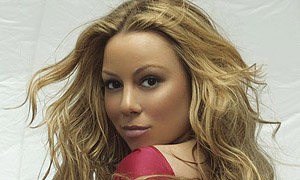
NITNF will usually be a bit of trivia that I found interesting and thought you would like. It may be IR-related and it might not -- but should always be fun...or at least fascinating.
Featured This Week: A unique take on the life and career of Mariah Carey!
Excerpts from Free at last: Mariah Carey—the voice. The marriage. The multiracial drama. The so-called breakdown. The return
In some ways Mariah Carey, 35, is everything you would expect a pop diva to be who has sold 150,000,000 albums -- comes third behind Elvis Presley and the Beatles -- for most weeks spent on the Billboard Hot Singles chart and who emerged from her decade-and-a-half career as the best-selling female artist of the 1990's.
Others' responses would often take Carey by surprise. After all, it was impossible to know when her "of color" status was going to make someone flip. "My struggles began when I was 5," she recalls. Two moments crystallized this for Carey: The first was when two White teacher's assistants laughed at her for trying to draw her father with a brown crayon. The second was Carey's taking her 6-year-old best friend to her father's house and her friend's bursting into tears at the sight of a Black man hugging his now obviously not-White daughter.
She says: Her relationship with Tommy Mottola is at the center of "one of the greatest misconceptions" about her. "People think I've had this fairy-tale life," she offers quietly, "that I met this rich prince who gave me a life in the lap of luxury, put me in a mansion, made me a star. It wasn't that way. In fact, it almost killed me."
She and Mottola met at an industry party in 1988, where Carey was an 18-year-old waitress. When she wasn't clearing tables, she was furiously writing songs on the side and singing backup for 1980's dance music sensation Brenda K. Starr.
There's a reason fairy tales usually end with the wedding. "It was an emotionally abusive relationship," Carey says simply, though she admits that it was "good in the beginning." She adds, "Tommy represented something I'd never had, stability. There was mutual respect and his passion for me and my music."
Somewhere along the way, Mottola's love for the woman and her music morphed into a Svengalian desire for total control. "I was in a beautiful house surrounded by beautiful things, but I couldn't be who I really was."
Still, life after Mottola was no picnic. Carey chose to stay on his label, a move she now realizes was unwise: "I was literally fighting against a system run by powerful people who had an agenda to see me fail." Eventually Carey moved on from her manager and lawyer -- both were Mottola-affiliated. Forced to micromanage her own career, Carey left Sony in 2000 and signed to Virgin Records for a cool $80 million.
To make matters worse, Carey's winning streak seemed to grind to a halt with her acting debut, Glitter. The movie received (deservedly) scathing reviews. The sound track, released on September 11, 2001, made very little impact on the charts. And the next year her Island/Def Jam debut, Charmbracelet, fared no better.
The consummate workaholic, Carey responded by going into overdrive -- meeting every request her fame demanded. Finally, after five days of a grueling schedule and public appearances where she clearly seemed less than herself (most famously on MTV's TRL, where the media reported she did a striptease, but Carey says it was a planned spoof), Carey finally collapsed at her mother's home in Long Island, New York. She was hospitalized for exhaustion. The press ran nasty stories about her waning sanity. Virgin reportedly gave her $28 million to leave the label.
Now she realizes that her much-hyped breakdown was the proverbial blessing in disguise. "it forced me to put the brakes on everything and admit my life wasn't working," she says. "I had to reevaluate myself and get recentered." Slowing down also helped her shed some personal baggage. "I discovered that my desire to make music came from the need to heal myself. My desire to become famous came from the need to feel worthy and accepted. And that made me more of a freak than I ever was."
Source: Essence, April 2005 (Author: Joan Morgan)
No comments:
Post a Comment